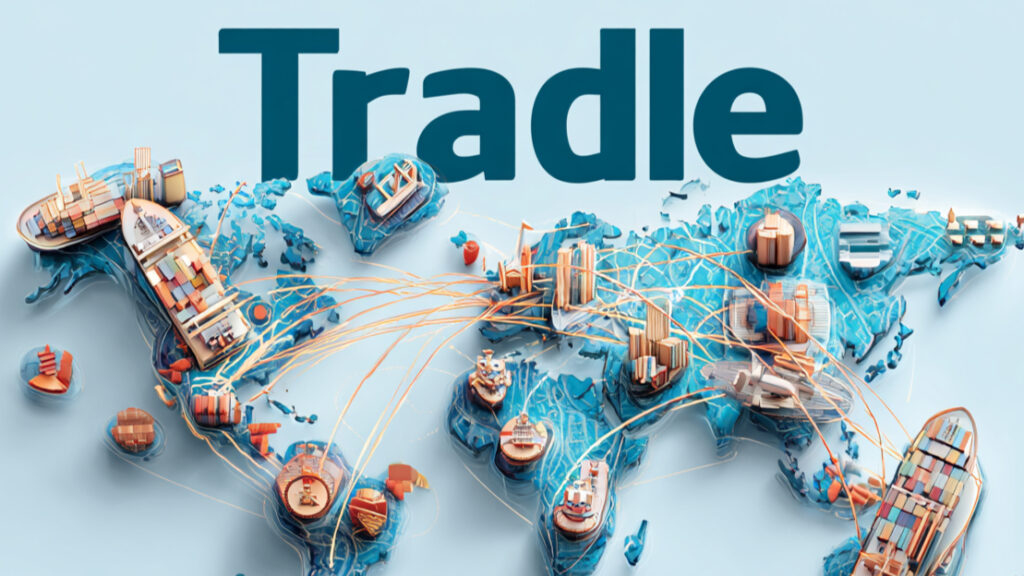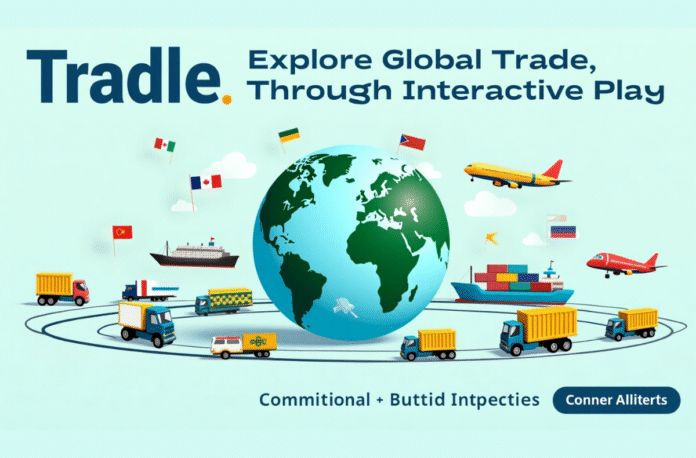International trade has never been more fun than with Tradle, the game-changing geography-based guessing game that turns complex economic information into an interactive experience. Tradle is a game that successfully bridges the gap between entertainment and education, providing a unique opportunity to explore global commerce through an intuitive gaming interface.
As educational gaming continues to evolve, web games like Tradle demonstrate how sophisticated economic concepts can be made accessible to diverse audiences. Using actual export data from the Observatory of Economic Complexity (OEC), Tradle allows players to test their knowledge of which countries export which goods.
This review analyzes the gameplay of Tradle and which educational value that can be drawn, as well as the effectiveness of the game as a learning tool. We discuss how the platform is coping with the rising thirst for interactive learning content, all the while ensuring that the content is still educational and the data is still valid. Whether you are a teacher looking for new classroom resources or a student studying economics worldwide, knowing what Tradle can and can’t do will help you get the most valuable insights from it.
Table of Contents
- Tradle’s Core Mechanics and Architecture
- Gameplay Experience and User Interface
- Educational Value and Learning Outcomes
- Export Data Analysis and Global Trade Patterns
- Game Modes and Feature Analysis
- Advantages and Limitations
- Comparison with Alternative Educational Games
- Practical Applications of Tradle
- Tradle Advanced Features and Export Analysis
- Advancing Strategic Trade Intelligence Through Tradle
- FAQs
Tradle’s Core Mechanics and Architecture
Tradle is built on a simple but powerful concept – find the countries through their export data. The game is an extraction of the exports of a mystery country, whose percentages and categories of goods correspond as hints to identify where on Earth it is. With the Tradle, you will be challenged to correctly guess the target country six times in a row, offering a system for learning through repetition and analytic thinking.
All export data are based upon genuine economic database of OEC that may be traced back to actual trade within a large database. This ‘hook’ of real-world statistics separates Tradle from generic geography games and players interact with real economic indicators as opposed to over-simplified versions.
Key Features of the Tradle
- Multiple Game Modes
- Daily challenges for consistent learning.
- “Tradle Unlimited” mode allows extended gameplay sessions.
- The game archive stores past puzzles.
- Flexible Learning Approach
- Supports various learning styles and schedules.
- Promotes methodical learning with consistent educational value.
- Interactive Data Visualization
- Displays export data.
- Offers both relative and quantitative perspectives, helping players:
- Deeper Economic Insights
- Enables analysis of both export composition and economic significance.
- Encourages critical thinking by comparing volume vs. value in exports.
For example, a nation’s export profile may exhibit large exports of oil accounting for 35% of all exports, but not indicate the monetary value of oil exports.
| Game Element | Description | Strategic Value |
|---|---|---|
| Export Data | Real OEC trade statistics | Authentic economic intelligence |
| Guess Limit | Six incorrect attempts maximum | Develops analytical precision |
| Daily Challenge | A new country profile each day | Consistent learning progression |
| Percentage Breakdown | Detailed export category analysis | Pattern recognition development |
| Visual Charts | Interactive data presentation | Enhanced comprehension |
Gameplay Experience and User Interface
The Tradle interface is impressively user-friendly, visualizing complex financial data cleanly and intuitively. Export information is listed in easy-to-read percentage splits, color-coded when applicable, to assist players in selecting the most important export categories on the fly. The game features a familiar guessing game aesthetic, with word games also inspired by this colored feedback to guide the player to the correct answer.
When players guess wrong, Tradle offers both directions information and distance measurements, adding a geographic learning element to the game outside of issue-related statistics alone. This feedback mechanism encourages players to think and act in terms of spatial relations and to memorize global trade patterns. The proximity indicators operate on a percent-based scale, giving players a measurable value to their skill that they can improve over time.
The game hits a good level of difficulty, some nations offer overt export signatures, while others require more in-depth consideration. Fish products may be a core export of a small island nation, and a large industrial nation may have more varied exports. The variation allows players to experience various degrees of difficulty, challenging them with new aspects of international trade and enhancing their game as they discover them.
Educational Value and Learning Outcomes
Tradle’s educational impact extends far beyond simple country identification, fostering a comprehensive understanding of global economic interconnectedness.
Beyond Country Identification
- Encourages a deep understanding of global economic interconnectedness.
- Moves past basic geography to highlight economic patterns and relationships.
Development of Analytical Skills
- Enhances pattern recognition as players match export profiles with:
- Geographic regions
- Economic development levels
- Natural resource availability
- Reinforces key concepts in:
- International economics
- Trade theory
- Comparative advantage
Understanding Geography’s Role in Economics
- Demonstrates how geographic factors shape economic activity:
- Coastal nations often focus on fish exports.
- Landlocked countries may specialize in minerals or agriculture.
- Highlights connections between climate, resources, and specialization.
Experiential Learning and Engagement
- Promotes active learning through gameplay repetition.
- Players internalize complex concepts more effectively than via traditional methods.
- Encourages players to:
- Hypothesize
- Test assumptions
- Refine understanding based on feedback
- Aligns with modern educational strategies emphasizing experiential learning and constructivist approaches.

Export Data Analysis and Global Trade Patterns
The following table illustrates typical export patterns featured in Tradle challenges, demonstrating the diversity of global trade relationships:
| Country | Key Export (as featured in Tradle) |
|---|---|
| Seychelles | Non-fillet Frozen Fish (41.5%) |
| Chile | Copper Ore (23.8%) |
| Finland | Refined Petroleum (15.2%) |
| Lebanon | Jewelry (12.7%) |
| Norway | Crude Petroleum (38.9%) |
| Iceland | Fish Fillets (18.3%) |
| Botswana | Diamonds (78.4%) |
| Ecuador | Crude Petroleum (33.1%) |
These export intensities indicate how countries exploit their comparative advantages in the world economy. Countries with significant natural resources tend to have higher specialization in primary commodities, while more developed economies tend to have a more diversified export structure. These trends provide rich information for the players to gain experience in economic development and international trade in the game.
The precision of information presented in the game trains players in real market data, rather than abstract simplifications. When they come across Seychelles’s fish exports or Botswana’s concentration of diamonds, players are dealing with actual economic data that represents today’s trade relations and market conditions.
Game Modes and Feature Analysis
Tradle offers several distinct gameplay modes, each designed to address different learning objectives and user preferences:
| Game Mode | Description | Learning Focus |
|---|---|---|
| Daily Tradle | Standard daily challenge | Consistent learning routine |
| Tradle Unlimited | Continuous gameplay | Intensive skill development |
| Pick 5 Tradle | Multiple country selection | Comparative analysis |
| Tradle Archive | Historical puzzle access | Progress tracking |
Unlimited mode is probably the best way to get the most out of what Tradle has to offer, and players can tackle numerous challenges back to back. This long play allows for the development of a more complex pattern of interactions and a more nuanced sense of the world market. The Pick 5 Tradle Edition requires players to do comparative analysis and pick multiple countries at the same time while learning regional trade patterns.
Tradle’s game archive is a powerful learning resource that allows players to return to the game, replay difficult levels, and measure how much they have improved from one game-playing session to the next. Moreover, this feature is conducive to reflective learning and would also enable teachers to develop a curriculum on country examples or trade relationships.
Advantages and Limitations
✅ Advantages of Tradle
- Integrates authentic export data (sourced from OEC) to enhance credibility.
- Features engaging gameplay mechanics that promote active learning.
- Offers comprehensive coverage of global trade patterns.
- Transforms complex economic concepts into interactive, accessible experiences.
- Appeals to diverse learning styles, making it effective across different audiences.
- Encourages analytical thinking and pattern recognition.
- Supports educational goals in both economics and geography.
- Moves beyond rote memorization to build critical reasoning skills.
⚠️ Limitations of Tradle
- Similar trade profiles among different countries can lead to repetitive or less varied gameplay.
- Focus on current trade data may overlook:
- Historical trade relationships
- Emerging economic trends
- Ambiguity in export profiles can confuse, as multiple countries might fit a given dataset.
- Players seeking clear-cut answers may find the open-ended nature of challenges frustrating.
- Data complexity, while realistic, may occasionally make gameplay more difficult than intended.
Comparison with Alternative Educational Games
The field of educational game platforms has several significant applications with differing approaches and educational goals. When put against a field, Tradle’s distinct position in this space and the particular benefits that it presents for learning and development stand out.
| Platform | Primary Focus | Educational Approach | Professional Relevance | Data Source |
|---|---|---|---|---|
| Tradle | Global Trade & Economics | Real economic data analysis | High – Business strategy, supply chain | OEC Trade Data |
| GeoGuessr | Geographic Knowledge | Visual location identification | Medium – Cultural awareness | Google Street View |
| Worldle | Country Recognition | Shape-based identification | Low – General knowledge | Geographic outlines |
| Countryle | Geographic Proximity | Distance-based deduction | Low – Spatial reasoning | Coordinate systems |
| Sporcle Geography | Regional Knowledge | Memorization exercises | Low – Factual recall | Static databases |
Practical Applications of Tradle
1. International Business Professionals
- Gain insight into global trade patterns, export specializations, and economic relationships between countries.
- Supports:
- Market analysis
- Supply chain planning
- Strategic decision-making in multinational operations.
2. Educators and Academic Professionals
- Can use Tradle as an interactive teaching tool for:
- Economics
- Geography
- International relations
- Benefits include:
- Making complex concepts more accessible
- Maintaining academic rigor through real-world data
- Building analytical skills relevant to economic analysis and critical thinking
3. Policy Analysts and Government Officials
- Use Tradle to better understand global trade relationships and export trends.
- Supports:
- Trade policy formulation
- Economic development planning
- International cooperation initiatives
- Lays a foundation for advanced economic and policy analysis.
Tradle Advanced Features and Export Analysis
The most advanced part of Tradle, in particular, is how it demonstrates the export data, scaled in a complete manner. Moreover, the website contains highly detailed breakdowns of the export compositions of individual countries, down to the pennies and the products they relate to, providing genuine economic data in the process. As a result, such complexity in modern international trade relationships allows players to understand what is truly at stake.
The table below illustrates the usual concentration of exports in one margin seen in Tradle challenges:
| Export Category | Percentage of Total Exports |
|---|---|
| Primary Commodities | 45-80% (developing nations) |
| Manufactured Goods | 60-85% (developed nations) |
| Services | 15-35% (service economies) |
| Raw Materials | 20-70% (resource-rich countries) |
Such patterns may provide a key in helping players learn the relationships between economic development, natural resources, geography, and export specialization. More sophisticated players learn to recognise countries by diversity or concentration of their exports, and by the types of products they export.
Advancing Strategic Trade Intelligence Through Tradle
Tradle is a game changer for educational gaming. They have managed to truly connect real economic issues with fun gameplay. Furthermore, the demonstration shows that sophisticated international trade concepts can be made accessible without compromising academic rigour or real-world relevance. As a result, Tradle revolutionizes the economic learning experience by enabling students to build real-world skills in international economics, data analysis, and global thinking.
What makes the game so engaging is its skillful conversion of passive instruction into active play, inviting players to make hypotheses, test assumptions and adjust their understanding in light of feedback. This method supports current pedagogical best practices along with the increasing need for technology-enabled interactive learning.
FAQs
Tradle uses export data from the Observatory of Economic Complexity (OEC), which bundles proprietary databases on international trade statistics. The platform refreshes often to keep current on trade relationships and market conditions, and players face real economic data instead of game speak.
Yes, Tradle can be used as a hard look for economics, geography and international relations classes. Teachers can use the site to help teach concepts such as comparative advantage, trade specialization and how economies around the world are interconnected. The interactive nature of the game helps to simplify advanced economic topics while being academically challenging.
The most common technical problems with Tradle involve server updates, overloads, and significant changes to data. If you are having trouble accessing the game, refer to official announcements on the platform’s social media before attempting alternate links. Tradle unlimited mode is often still open when the standard game is in maintenance.
A few games offer similar mechanics to Tradle and target other aspects of education. Globle is a game it challenges players to find countries by proximity, where Flagle uses country flag images to find the country. Yet Tradle is still the only one that focuses on financial data and trade relationships.
The Tradle Game Archive is an archive of puzzles and solutions saved in various formats. By examining responses to TrAdLE clues, players can see patterns of where their knowledge is missing and learn how to spot various export profiles and economic indicators.











